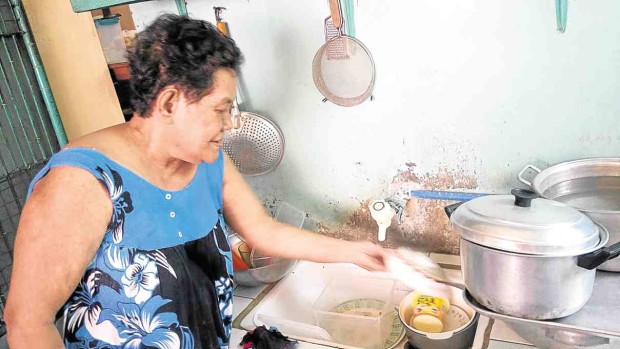
DRY SPELL The dirty dishes pile up before Maria Llora Osite, just one of the Muntinlupa City residents waiting for a drop from their faucets. Carizza Ibañez
FOR THE past several days, Maria Llora Osite has been forced to buy “gallons and gallons of mineral water just to take a bath.”
“Can you believe how much I’m spending now?’’ said the 63-year-old Osite, who had also resorted to using disposable spoons, forks and plates as taps in her neighborhood in Barangay Putatan, Muntinlupa City, went dry.
Osite is among the thousands of residents coping with the on-and-off service from Maynilad Water Services Inc. Around 120,000 households in Muntinlupa, Las Piñas City, and Parañaque City, as well as in Cavite City, Imus, Novelleta, Rosario and Bacoor in Cavite province have been affected since June 10, according to the utility firm.
In a statement, Maynilad issued an apology and explained that “we were constrained to further reduce production of our treatment plant (in Putatan) in our effort to maintain water quality despite the worsening quality of raw water from Laguna Lake and ongoing rehabilitation works in our facility.”
Mitigation measures—like rationing—would be in place “until our treatment facility returns to normal levels of production in July,’’ the utility firm said.
The shortage has gotten worse over the last few days. “Before, even if there was a service interruption every day, the supply would come back quickly. But now we have to wait much longer,’’ said Osite.
“And when the water finally comes back, you need to wait for 30 more minutes because what usually comes out first from the tap is rust-colored water. You just can’t use it,” said Elisa Sobreviga, 25, who lives nearby.
Washing priorities
Because neighbors open their faucets almost at the same time to stock up on water, everyone ends up getting a mere trickle. “If we are lucky enough to fill up a pail, I have to prioritize the kids who need a bath, the dirty dishes, the laundry,’’ she said. Sometimes, the used water is recycled either for flushing the toilet or watering the plants.
On Wednesday, however, Sobreviga learned that a neighbor had access to a deep well and was selling water at P3 per container. “We took the offer since the faucet was useless the whole day.’’
“We pay properly, so (Maynilad) should fix their services,’’ Osite said. “They should do something quickly about this.”
“We apologize for the inconvenience this situation has caused,” Maynilad said, adding that the intermittent service was due to the reduced output from its treatment plant in Putatan, Muntinlupa.
“(To) mitigate the effect of the facility’s intermittent output,” Maynilad has been deploying 39 tankers to the affected areas since June 10, the utility firm said. Nine more tankers will be deployed and two stationary water tanks will be installed to “accommodate more requests for rationing.”
“Maynilad is also implementing valve adjustments to better manage supply in the distribution system, so that we can return to the scheduled supply window for Muntinlupa, Parañaque and Cavite at the soonest possible time,” it said.
High manganese levels
“Also, with the onset of the rainy season, we expect the quality of water from the lake to improve and our production to increase,” it said. “Please bear with us as we facilitate rehabilitation works in our treatment facility.”
In late April, Maynilad said the raw water processed for the southern part of Metro Manila showed high levels of manganese, but assured customers that the supply that was being distributed was still within the parameters set by the Philippine National Standards for Drinking Water (PNSDW).
The firm then traced the problem to Laguna de Bay as customers complained about the discolored water coming from their taps. Since the onset of the El Niño phenomenon in the last quarter of 2015, the lake’s water level has steadily decreased while the high summer temperatures “further exacerbated” the water quality, the company said.
In an Inquirer interview on Thursday, Jennifer Rufo, head of stakeholder communications at Maynilad, clarified that the issue concerning manganese in the raw water from the Laguna de Bay was a matter of discoloration and not sufficiency in supply.
Rufo said the presence of manganese in the lake caused “temporary discoloration” in the water supply in southern Metro Manila in April. But she said this was resolved in less than 48 hours, mainly through adjustments in the operations of Maynilad’s treatment facility and flushing of pipelines in the affected areas.
“In the letter that we sent to our affected customers, we clearly stated that except for the discoloration, our water supply is still within the parameters set by the PNSDW,” Rufo said. “We wish to assure them that we are constantly monitoring the characteristics of the water in Laguna Lake, and we have the necessary technologies in place to continue producing water that meets the PNSDW.”